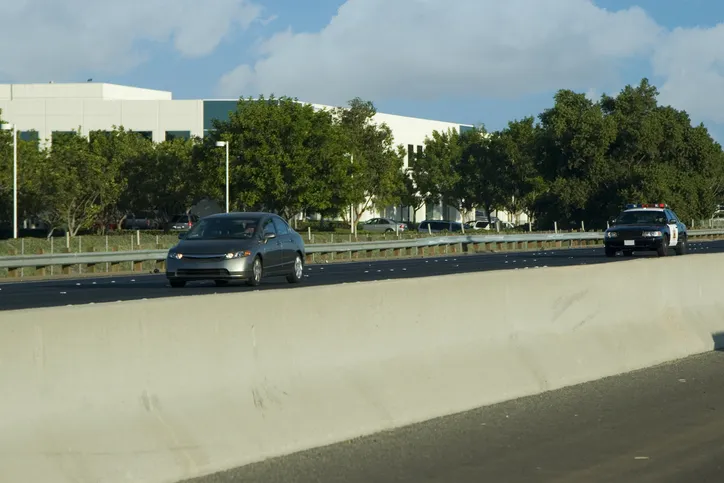
N.Y. Penal Law § 270.35- § 270.25: Unlawfully Fleeing a Police Officer in a Motor Vehicle
While traffic stops are serious, they usually do not rise to the criminal level. The majority of motorists are respectful of the process, accept their tickets and carry on with their day. Unless there are extenuating circumstances (for example a motorist has a suspended license), most drivers will not face criminal charges during a traffic stop.
However, some will. New York Penal Law § 270.25 - §270.35 - is a block of sections in the New York Criminal Code that rewards a deliberate choice. These statutes concern the unlawful fleeing from a police officer in a motor vehicle. If an officer orders you to stop, either by verbally telling you at the window, or through the sirens and lights on the car while they are around you, it is in your best interest to do so. It is much better to receive a traffic ticket and then address it in court. Running away from the traffic stop is possibly the worst decision to make at that moment.
Law enforcement agencies are in communication with each other. As you drive away from the stop, the officer will contact support. On top of trying to catch you they will also be keeping track of every new traffic violation that occurs. For example, what originated as a speeding ticket can be supplemented by multiple unsafe lane changes, failed to signal, etc. You will also likely be charged with another speeding violation for each jurisdiction that you drive though until you are apprehended. To add to the gravity of the matter, this situation is a breeding ground for accidents and fatal injuries to bystanders, motorists, and law enforcement. For these reasons, the legislature has come up with various degrees, listed below.
N.Y. Penal Law § 270.25: Unlawfully Fleeing a Police Officer in a Motor Vehicle in the Third Degree
This section’s threshold is not the level of injury, but the rate of speed. A person is guilty of Penal Law § 270.25 if they have fled at a rate exceeding 25 mph of the posted speed limit. For example, if you are fleeing at 60 mph in a 30-mph zone, you would still be guilty of the section even though 60 mph is not a stereotypically “high” speed.
Third degree fleeing is a class A misdemeanor. The possible sentence is a maximum of one year plus fines and possibility of probation. A misdemeanor will still be a criminal conviction with a myriad of consequences on top of it.
N.Y. Penal Law § 270.30: Unlawfully Fleeing a Police Officer in a Motor Vehicle in the Second Degree
This section is for more serious situations and is a felony. You will be found guilty if you were driving recklessly and caused serious physical injury to a police officer or third person as a result. The penalty is a class E Felony is between a one-to-five-year prison sentence, thousands in fines and possible probation.
Serious physical injury can range anywhere from broken bones to paralysis. In the event that an officer and/or third party is injured in any way, you should prepare yourself for the possibility of being charged with a felony.
N.Y. Penal Law § 270.35: Unlawfully Fleeing a Police Officer in a Motor Vehicle in the First Degree
As a class D felony, this section carries the most serious consequences. You will be found guilty if you were driving recklessly and killed a police officer or third person as a result.
Felonies are the highest level of crime in New York, ranging from “A” to “E”. A first-time conviction to a class D felony will net you a prison sentence of up to seven years, significant fines and/or probation. In addition, felony convictions carry lifelong consequences for employment, immigration, firearms and voting.
The above sections are not limited to cars. In fact, they are commonly issued to motorcyclists. A citation for any one of them should be followed by a phone call to an attorney. All three degrees carry a set of heavy consequences if not managed appropriately.
Benjamin Goldman Law Office
For any Unlawfully Fleeing charges, you can contact the Benjamin Goldman Law Office. We are a New York State law firm that handles all types of traffic related charges. Our firm handles criminal charges such as DWI and Aggravated Unlicensed Operator. Attorneys at our firm have experience handling Fleeing charges and will be glad to take on your case. The Benjamin Goldman Law Office has received hundreds of five star reviews over the years across several platforms. The verified testimonials speak to the efforts we put into each case. Contact us about your case at your convenience. We look forward to working with you.
Other Traffic Violations We Handle
If you were injured by a motorist who was fleeing from the cops, you can contact the Sternberg Injury Law Firm for a consultation
Disclaimer: All the content of this website has been prepared by Benjamin Goldman Law Office PC for informational purposes only and does not constitute legal advice. The information on this website shall not be construed as an offer to represent you, nor is it intended to create, nor shall the receipt of such information constitute, an attorney-client relationship. Our hope is that you will find the information useful and informative, and we would be happy to communicate with you and answer any questions you may have about our legal services. Readers should not act upon the information on this website, or decide not to act based upon the information on this website, without first seeking appropriate professional counsel from an attorney licensed in the home state of the drivers license of the person who received the relevant traffic citation.